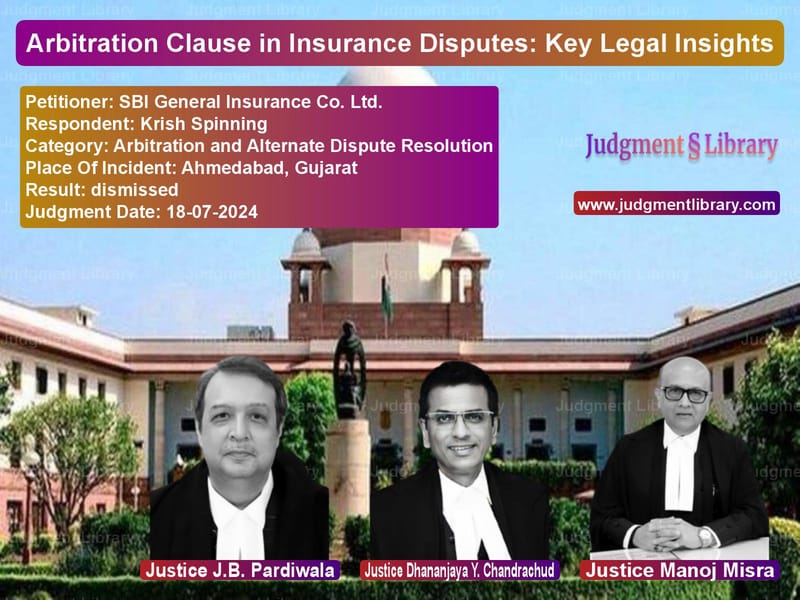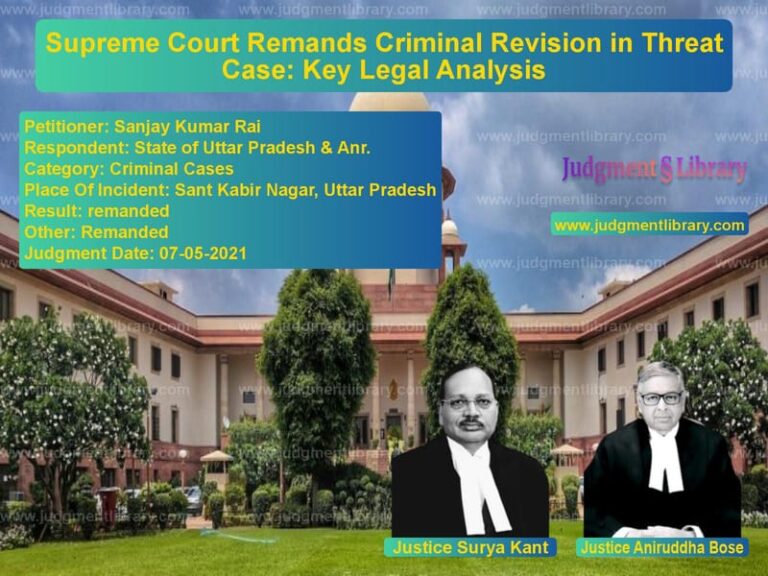Arbitration Clause in Insurance Disputes: Key Legal Insights
The case of SBI General Insurance Co. Ltd. vs. Krish Spinning is a crucial ruling concerning arbitration in insurance claims. The Supreme Court addressed the question of whether signing a discharge voucher in full and final settlement precludes a party from invoking arbitration. The Court analyzed the validity of such settlements, the scope of arbitration agreements, and the role of courts under the Arbitration and Conciliation Act, 1996.
The dispute arose when Krish Spinning, a textile manufacturer, suffered heavy losses due to a fire at its manufacturing unit. The company filed a claim with SBI General Insurance under its fire insurance policy, but the insurer offered a lower settlement amount than what was claimed. Initially, the insured accepted the settlement by signing a discharge voucher but later sought arbitration for the remaining claim, alleging that the settlement was accepted under coercion and financial distress.
Factual Background
Krish Spinning had obtained a fire and special perils insurance policy from SBI General Insurance, covering damages up to Rs 7.2 crore. The policy covered fire, lightning, and other perils. During the policy period, two separate fire incidents occurred at the factory premises, causing substantial damage to machinery and stock.
The insurer appointed a surveyor to assess the losses and determine the payable amount. Based on the surveyor’s report, SBI General Insurance offered Rs 84,19,579 for the first fire incident as a full and final settlement. The insured, under financial distress, signed the discharge voucher and accepted the payment. However, after receiving the final claim amount for the second fire, Krish Spinning disputed the first settlement, claiming that the insurer forced them into an unfair settlement.
Legal Issues Raised
- Whether the execution of a discharge voucher automatically bars arbitration.
- The extent of judicial review permissible under Section 11 of the Arbitration and Conciliation Act, 1996.
- Whether the insurer’s conduct amounted to coercion or undue influence.
- The impact of a prior settlement on the right to invoke arbitration.
Arguments by the Appellant (SBI General Insurance)
- The insured voluntarily accepted the settlement and executed a discharge voucher, which constituted a legally binding agreement.
- There was no evidence of coercion or undue influence, as the insured had multiple opportunities to reject the settlement.
- The insured’s claims were time-barred, as the dispute was raised years after signing the discharge voucher.
- Under the principle of accord and satisfaction, no disputes survived for arbitration.
Arguments by the Respondent (Krish Spinning)
- The insurer compelled the insured to accept a lower settlement amount due to financial distress.
- The insurer did not provide a copy of the survey report, despite repeated requests, preventing the insured from making an informed decision.
- The discharge voucher was signed under economic duress to secure the pending payment.
- Under the arbitration clause in the insurance policy, disputes over the quantum of claim must be resolved through arbitration.
Supreme Court’s Observations
- An arbitration agreement remains valid even after a contract is discharged unless explicitly negated.
- A discharge voucher does not automatically bar arbitration if allegations of coercion or undue influence exist.
- The role of courts at the referral stage under Section 11 of the Arbitration Act is limited to determining the existence of an arbitration agreement.
Final Judgment
The Supreme Court ruled in favor of Krish Spinning, affirming the High Court’s decision to appoint an arbitrator. The Court held:
- The dispute regarding the validity of the discharge voucher should be examined by the arbitrator.
- The arbitration clause in the insurance policy covers disputes regarding the claim amount.
- The insurer’s objections about coercion and settlement will be decided during arbitration.
Thus, the Court reinforced the principle that arbitration agreements should be upheld unless they are manifestly non-arbitrable.
Implications of the Judgment
- Strengthening Arbitration Mechanisms: Courts will uphold arbitration agreements even in cases of prior settlements.
- Protection Against Economic Duress: Insured parties can challenge unfair settlements where coercion is alleged.
- Limited Judicial Review: Courts should not interfere in arbitration proceedings unless the dispute is clearly non-arbitrable.
Conclusion
The Supreme Court’s decision in this case reaffirms India’s pro-arbitration approach, ensuring that genuine commercial disputes are resolved through arbitration rather than prolonged litigation. The ruling provides clarity on the enforceability of arbitration clauses in insurance policies, protecting policyholders from unfair settlements.
Petitioner Name: SBI General Insurance Co. Ltd..Respondent Name: Krish Spinning.Judgment By: Justice J.B. Pardiwala, Justice Dhananjaya Y. Chandrachud, Justice Manoj Misra.Place Of Incident: Ahmedabad, Gujarat.Judgment Date: 18-07-2024.
Don’t miss out on the full details! Download the complete judgment in PDF format below and gain valuable insights instantly!
Download Judgment: sbi-general-insuranc-vs-krish-spinning-supreme-court-of-india-judgment-dated-18-07-2024.pdf
Directly Download Judgment: Directly download this Judgment
See all petitions in Arbitration Awards
See all petitions in Dispute Resolution Mechanisms
See all petitions in Insurance Settlements
See all petitions in Contract Disputes
See all petitions in Enforcement of Awards
See all petitions in Judgment by J.B. Pardiwala
See all petitions in Judgment by Dhananjaya Y Chandrachud
See all petitions in Judgment by Manoj Misra
See all petitions in dismissed
See all petitions in supreme court of India judgments July 2024
See all petitions in 2024 judgments
See all posts in Arbitration and Alternate Dispute Resolution Category
See all allowed petitions in Arbitration and Alternate Dispute Resolution Category
See all Dismissed petitions in Arbitration and Alternate Dispute Resolution Category
See all partially allowed petitions in Arbitration and Alternate Dispute Resolution Category







